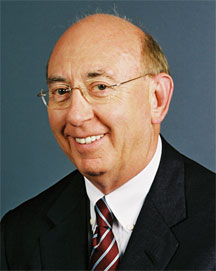
Colorectal cancer (CRC), also known as bowel cancer, colon cancer, or rectal cancer, is the development of cancer from the colon or rectum. Signs and symptoms may include blood in the stool, a change in bowel movements, weight loss, abdominal pain and fatigue. Most colorectal cancers are due to old age and lifestyle factors, with only a small number of cases due to underlying genetic disorders. Risk factors include diet, obesity, smoking, and lack of physical activity. Dietary factors that increase the risk include red meat, processed meat, and alcohol. Another risk factor is inflammatory bowel disease, which includes Crohn's disease and ulcerative colitis. Some of the inherited genetic disorders that can cause colorectal cancer include familial adenomatous polyposis and hereditary non-polyposis colon cancer; however, these represent less than 5% of cases. It typically starts as a benign tumor, often in the form of a polyp, which over time becomes cancerous.

Roswell Park Comprehensive Cancer Center is a cancer research and treatment center located in Buffalo, New York. Founded by surgeon Roswell Park in 1898, the center was the first in the United States to specifically focus on cancer research. The center is usually called Roswell Park in short. The center, which conducts clinical research on cancer as well as the development new drugs, provides advanced treatment for all forms of adult and pediatric cancer, and serves as a member of the National Comprehensive Cancer Network. Roswell Park Comprehensive Cancer Center is as of 2019, the only upstate New York facility to hold the National Cancer Institute designation of "comprehensive cancer center".

Ludwig Cancer Research is an international community of scientists focused on cancer research, with the goal of preventing and controlling cancer. It encompasses the Ludwig Institute for Cancer Research, an international non-profit organization founded in 1971 by philanthropist Daniel K. Ludwig. The Institute is headquartered in New York City, with a European office located in Zürich. There are currently three Ludwig Branches: Ludwig Lausanne, Ludwig Oxford and Ludwig Princeton. In addition, there are six Ludwig Centers at leading institutions across the United States of America. Together, the Institute, Branches and Centers are known as Ludwig Cancer Research.
The Children's Oncology Group (COG), a clinical trials group supported by the National Cancer Institute (NCI), is the world's largest organization devoted exclusively to pediatric cancer research. The COG conducts a spectrum of clinical research and translational research trials for infants, children, adolescents, and young adults with cancer.

Moffitt Cancer Center & Research Institute is a nonprofit cancer treatment and research center located in Tampa, Florida. Established in 1981 by the Florida Legislature, the hospital opened in October 1986 on the University of South Florida's campus. Moffitt is one of two National Cancer Institute-designated Comprehensive Cancer Centers based in Florida. In 2021, U.S. News & World Report ranked Moffitt Cancer Center as a top 30 cancer hospital in the United States.

Appendix cancer, also known as appendiceal cancer, is a very rare malignant tumor that forms in the vermiform appendix.

Richard G. Pestell is an Australian American oncologist, endocrinologist and research scientist. Pestell was appointed an Officer of the Order of Australia for distinguished service to medicine and medical education in 2019 by Queen Elizabeth II. He was previously Executive Vice President of Thomas Jefferson University and Director of the Sidney Kimmel Cancer Center of Thomas Jefferson University. As a serial entrepreneur he founded six biotechnology companies developing cancer therapy and diagnostics. He is currently Distinguished Professor, Translational Medical Research, and the President of the Pennsylvania Cancer and Regenerative Medicine Research Center at the Baruch S. Blumberg Institute.
Delcath Systems, Inc. is a publicly traded specialty pharmaceutical and medical device company, that develops percutaneous perfusion technologies for the targeted administration of high-dose chemotherapeutic agents to specific organs or regions of the body. Based in Queensbury, New York, the company has an intellectual property portfolio consisting of 28 patents worldwide. Delcath's Percutaneous Hepatic Perfusion (PHP) is currently undergoing Phase II and Phase III trials against tumors in the liver. Delcath has a Cooperative Research and Development Agreement (CRADA) with the National Cancer Institute and has received Fast Track and a Special Protocol Assessment from the Food and Drug Administration for its use of melphalan in treating unresectable liver tumors. PHP, also known as the Delcath System, is tested for the treatment of metastatic melanoma in the liver and for primary liver cancer and metastatic hepatic malignancies from neuroendocrine cancers and adenocarcinomas, as well as patients with melanoma who previously received isolated perfusion. Chemotherapy is usually delivered intravenously, although a number of agents can be administered orally.

Oncology is a branch of medicine that deals with the study, treatment, diagnosis, and prevention of cancer. A medical professional who practices oncology is an oncologist. The name's etymological origin is the Greek word ὄγκος (ónkos), meaning "tumor", "volume" or "mass". Oncology is concerned with:
CA 242 is a tumor marker for sialylated Lewis carbohydrates associated with adenocarcinomas and e-selectin-mediated metastatic risk. It is commonly tested along with CEA, CA19-9, and CA242 for detecting pancreatic cancer. The specificity of CA 242 is higher than similar markers. Current research dictates that diagnostic efficiency is highest when various tumor markers are tested for at once.

John E. Niederhuber was the 13th director of the National Cancer Institute (NCI), from 2006 until July, 2010, succeeding Andrew von Eschenbach, who went on to become a director at biotechnology firm BioTime. A nationally renowned surgeon and researcher, Dr. Niederhuber has dedicated his four-decade career to the treatment and study of cancer - as a professor, cancer center director, National Cancer Advisory Board chair, external advisor to the NCI, grant reviewer, and laboratory investigator supported by NCI and the National Institutes of Health. He is now Executive Vice President/CEO Inova Translational Medicine Institute and Inova Health System and co-director, Johns Hopkins Clinical Research Network.
Wafik El-Deiry is an American physician and cancer researcher who is the Associate Dean for Oncologic Sciences at the Warren Alpert Medical School, Brown University, Director of the Cancer Center at Brown University, and the Director of the Joint Program in Cancer Biology at Brown University and its affiliated hospitals. He was previously deputy director of Translational Research at Fox Chase Cancer Center, where he was also co-Leader of the Molecular Therapeutics Program.
Src kinase family is a family of non-receptor tyrosine kinases that includes nine members: Src, Yes, Fyn, and Fgr, forming the SrcA subfamily, Lck, Hck, Blk, and Lyn in the SrcB subfamily, and Frk in its own subfamily. Frk has homologs in invertebrates such as flies and worms, and Src homologs exist in organisms as diverse as unicellular choanoflagellates, but the SrcA and SrcB subfamilies are specific to vertebrates. Src family kinases contain six conserved domains: a N-terminal myristoylated segment, a SH2 domain, a SH3 domain, a linker region, a tyrosine kinase domain, and C-terminal tail.

Warren Jackson Pledger is a molecular cell biologist who is the Associate Director for Basic Sciences, Tampa General Hospital Cancer Institute and Professor, Department of Molecular Medicine, Morsani College of Medicine, USF Health in Tampa, Florida. He had been a Professor, Department of Surgery, University of Utah School of Medicine and a member of the Cell Response and Regulation Program, Huntsman Cancer Institute. He was the Associate Center Director for Basic Science at the Moffitt Cancer Center and Research Institute. He has held academic appointments and tenure at the University of North Carolina School of Medicine, Vanderbilt University School of Medicine and the University of South Florida College of Medicine.
Ralph R. Weichselbaum is an American physician specializing in radiation oncology, a member of the Institute of Medicine of the National Academy of Sciences, Ludwig professor, He is Daniel K. Ludwig Distinguished Service Professor of Radiation Oncology and Chairman, Department of Radiation and Cellular Oncology, at the University of Chicago Pritzker School of Medicine, and Head of the University of Chicago Center for Radiation Therapy, and the director of the Chicago Tumor Institute. Weichselbaum is also Co- Director of the Ludwig Center for Metastasis Research at the University of Chicago.

Triciribine is a cancer drug which was first synthesized in the 1970s and studied clinically in the 1980s and 1990s without success. Following the discovery in the early 2000s that the drug would be effective against tumours with hyperactivated Akt, it is now again under consideration in a variety of cancers. As PTX-200, the drug is currently in two early stage clinical trials in breast cancer and ovarian cancer being conducted by the small molecule drug development company Prescient Therapeutics.

The University of Michigan Rogel Cancer Center is a cancer research and treatment institution based in Ann Arbor, Michigan, United States. The Rogel Cancer Center is affiliated with the University of Michigan and Michigan Medicine.

David R. Gius is an American physician-scientist the Zell Family Scholar Professor, Women's Cancer Research Program director, and Vice Chair of Translational Research at Northwestern University's Feinberg School of Medicine Department of Radiation Oncology and Pharmacology. His research focuses into the mechanistic connection between aging, cellular and/or mitochondrial metabolism, and carcinogenesis focusing on the Sirtuin gene family.

Duane A. Mitchell is an American physician-scientist and university professor. He is currently employed at the University of Florida College of Medicine, in Gainesville, Florida as the Assistant Vice President for Research, Associate Dean for Translational Science and Clinical Research, and Director of the University of Florida (UF) Clinical and Translational Science Institute. He is the Phyllis Kottler Friedman Professor in the Lillian S. Wells Department of Neurosurgery. and co-director of the Preston A. Wells Jr. Center for Brain Tumor Therapy. Mitchell is also the founder, President, and Chairman of iOncologi, Inc., a biotechnology company in Gainesville, FL specializing in immuno-oncology.
Gary Herbert Lyman is an American academic hematologist, medical oncologist, and cancer researcher.













